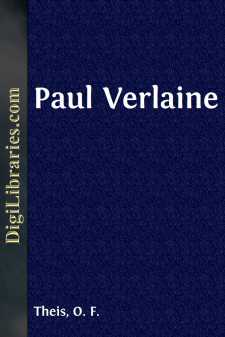Categories
- Antiques & Collectibles 13
- Architecture 36
- Art 48
- Bibles 22
- Biography & Autobiography 813
- Body, Mind & Spirit 142
- Business & Economics 28
- Children's Books 17
- Children's Fiction 14
- Computers 4
- Cooking 94
- Crafts & Hobbies 4
- Drama 346
- Education 46
- Family & Relationships 57
- Fiction 11829
- Games 19
- Gardening 17
- Health & Fitness 34
- History 1377
- House & Home 1
- Humor 147
- Juvenile Fiction 1873
- Juvenile Nonfiction 202
- Language Arts & Disciplines 88
- Law 16
- Literary Collections 686
- Literary Criticism 179
- Mathematics 13
- Medical 41
- Music 40
- Nature 179
- Non-Classifiable 1768
- Performing Arts 7
- Periodicals 1453
- Philosophy 64
- Photography 2
- Poetry 896
- Political Science 203
- Psychology 42
- Reference 154
- Religion 513
- Science 126
- Self-Help 84
- Social Science 81
- Sports & Recreation 34
- Study Aids 3
- Technology & Engineering 59
- Transportation 23
- Travel 463
- True Crime 29
Paul Verlaine
by: O. F. Theis
Description:
Excerpt
PRELUDE
The works of great artists are silent books of eternal truths. And thus it is indelibly written in the face of Balzac, as Rodin has graven it, that the beauty of the creative gesture is wild, unwilling and painful. He has shown that great creative gifts do not mean fulness and giving out of abundance. On the contrary the expression is that of one who seeks help and strives to emancipate himself. A child when afraid thrusts out his arms, and those that are falling hold out the hand to passers-by for aid; similarly, creative artists project their sorrows and joys and all their sudden pain which is greater than their own strength. They hold them out like a net with which to ensnare, like a rope by which to escape. Like beggars on the street weighed down with misery and want, they give their words to passers-by. Each syllable gives relief because they thus project their own life into that of strangers. Their fortune and misfortune, their rejoicing and complaint, too heavy for them, are sown in the destiny of others—man and woman. The fertilizing germ is planted at this moment which is simultaneously painful and happy, and they rejoice. But the origin of this impulse, as of all others, lies in need, sweet, tormenting need, over-ripe painful force.
No poet of recent years has possessed this need of expressing his life to others, more imperatively, pitifully, or tragically than Paul Verlaine, because no other poet was so weak to the press of destiny. All his creative virtue is reversed strength; it is weakness. Since he could not subdue, the plaint alone remained to him; since he could not mould circumstances, they glimmer in naked, untamed, humanly-divine beauty through his work. Thus he has achieved a primæval lyricism—pure humanity, simple complaint, humbleness, infantile lisping, wrath and reproach; primitive sounds in sublime form, like the sobbing wail of a beaten child, the uneasy cry of those who are lost, the plaintive call of the solitary bird which is thrown out into the dusk of evening.
Other poets have had a wider range. There have been the criers who with a clarion horn call together the wanderers on all the highways, the magicians who weave notes like the rustling of leaves, the soughing of winds and the bubbling of water, and the masters who embrace all the wisdom of life in dark sayings. He possessed nothing but the sign-manual of the weak who have need of another, the gestures of a beggar. But in all their accents and nuances, in him, these became wonderful. In him were the low grumbling of the weak man, sometimes closely akin to the sorrowful mumbling of the drunkard, the tender flute notes of vague and melancholic yearning, as well as the hard accusing hammering against his own heart. There were in him the flagellant strokes of the penitent as well as the intimate prayers of thanksgiving which poor women murmur on church steps. Other poets have been so interwoven with the universal that it is impossible to distinguish whether really great storms trembled in their breasts, whether the sea rolled within them, or again, whether it was not their words, which made the meadows shudder, and which, as a breeze, went tenderly over the fields....


